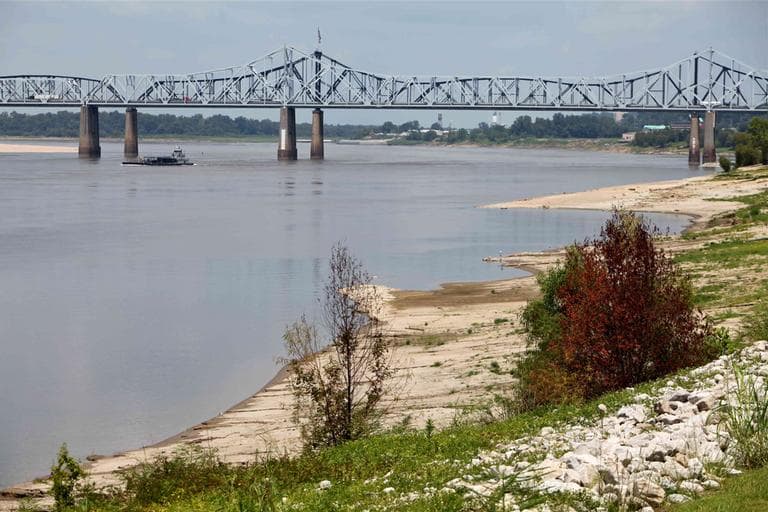Advertisement
A Trip Down The Drought-Ridden Mississippi River
Resume
The Mississippi River has had a wild 12 months. This time last year, the river was at flood level. These days, it's near historic lows. From Illinois southward, the low water levels are affecting commerce, tourism, and just everyday life. The biggest impact may be on shipping, as businessman Larry Daily of Bettendorf Iowa. He works at Alter Logistics, he firm specializes in getting cargo moved along the river, and he explained how the drought impacts him:
In our area, we are part of what's called a locking river. Above St. Louis, Missouri and all the way up to St. Paul/Minneapolis, there's a series of 27 locks and dams that hold the water back to provide a nine foot channel for shipping. Right now in our area, we're a foot away from the lowest water we've ever recorded, but we're only about 5 feet lower than what is normal at this time. But the big problems begin when you get down below St. Louis where there are no locks and damns to control the river, and we're in dire straits in some places. Around the Memphis, Tennessee area and around the Greenvile, Mississippi area, we're having delays while the Corps of Engineers uses their dredges to dig out new channels because the river down there is reaching record lows. And.it's a sharp contrast to the record highs we had last year. Certain places on the lower Mississippi River there's 50 feet of difference between the high water of 2011 and the low water we're having right now. It's causing delays with boats having to wait for the channel to be cleared, smaller tow sizes is affecting the profitability of companies.
Further down river, in Dorena, Missouri, Tammi Hutcheson runs the Mississippi County Port Authority — it provides ferry service connecting Dorena with Hickman, Kentucky. The ferry is back up operating because of dredging, but it was shut down for several weeks.
This year we have seen record low levels of the Mississippi River. We were shutdown on June 23rd, because of low water, we were unable to get out of the Hickman Harbor on the Kentucky side until the harbor was dredged, the dredge moved in two weeks ago. We were able to start running about 4-5 days ago. It's been very abnormally low water level this yrs. And we hope to see more water because it's really a hardship on everyone to cross from one side of the river to the other at this point. You have to go 75 miles and about an hour and half extra out of your way to get from Missouri to Kentucky. Right now the water is so low there are sand bars all over the river and it really looks like at points you could possibly walk out to a point and swim across.

The drought is also impacting the town where one of the most famous riverboat pilots in the world grew up: Hannibal, Missouri. Cindy Lovell of the Mark Twain Boyhood Home and Museum in Hannibal, Missouri, reminds us of the river that Samuel Clemens wrote about as Mark Twain. Clemens also worked briefly as a riverboat pilot.
Anyone who's read "Life on the Mississippi" or "Adventures of Huckleberry Finn" knows that the Mississippi River is a main character in Twain's writing. Everything came by river: people, commerce, communication, mail. He saw all kinds of goods loaded and unloaded as freight here in Hannibal, including human lives — men and women who were enslaved. Going down the river he once encountered slaves here in Hannibal, chained and waiting. He said it was the saddest group of faces he'd ever seen. And I can only imagine those indelible images stayed with him.
This segment aired on August 17, 2012.